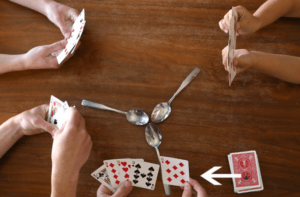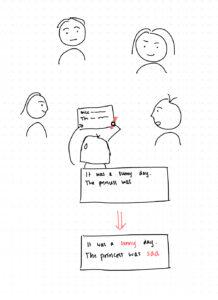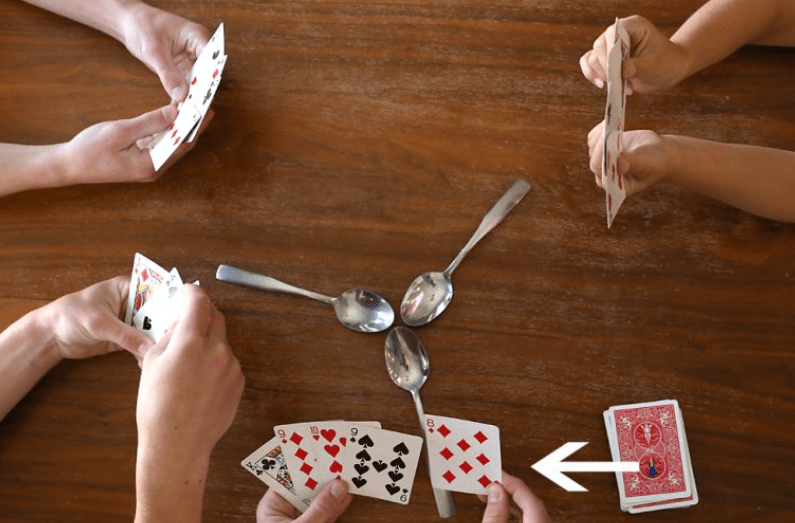For my critical play, I decided to play “Spoons”, a popular card game for all ages. It’s unclear who the original creator is — it’s believed to have originated in North America in the 20th century. The game requires a deck of cards and n-1 spoons, where n is the number of players. Each player starts with four random cards and the spoons in the middle of the group. The goal for each player is to get 4 of a kind in their hand. The remaining card deck is passed around, and a player can check the card from the top of the deck and decide whether to replace one of their cards with it. Once a player reaches 4 of a kind, they grab a spoon — the rest of the players then have to quickly grab a spoon. The player who isn’t able to grab a spoon is out of the game, and the next round continues with one less player and one less spoon until there’s one winner remaining. Furthermore, although I’m not sure if this is an official game rule, whenever I’ve played Spoons it’s also a norm that the first player to grab a spoon should try to do it discreetly so it’s hard for other players to notice. This makes the game more engaging because players have to constantly multitask, checking back and forth between their deck and the pile of spoons in case another player sneaks one away.

I chose Spoons mainly for this multitasking facet of the game. This makes it similar to our game concept, which similarly incorporates observation and multitasking. In our game, “Writer’s Block”, players need to carefully observe other players’ mannerisms and words in order to deduce who the spies are and what their missions could be, while at the same time strategizing about how to continue the sentences for the story theme. When we were play testing our game concept, I found the experience of observing each player per turn to be quite similar to my experience in Spoons of checking whether a player picks up a spoon after they look at the deck. Both involve an awareness that some event that is bound to occur during the round; i.e. a player picks up a spoon or a spy carries out some mission on their turn. But they don’t know when this event will happen, since in Spoons there’s no way to see other players’ hand and in Writer’s Block you don’t know who the spies are. This combination of knowing that an event will happen but not knowing when leads to a game that encourages careful observation of other players’ actions.

This core feature of both games reminds me of the paper we read on what games are and what they aren’t. A central theme of the paper talked about how ‘fun’ is the feedback our brains give us when we’re absorbing patterns and learning; our brains want to be cognitively challenged. By building in this need for careful observation, both Spoons and Writer’s Block encourage our brains to constantly and actively take in new information, as well as learn to recognize strategies and patterns. For example, in Spoons, maybe a player figures out that the most efficient way for them to multitask is to quickly check the number of spoons after each player’s turn, or another option could be to look at each player instead to check for any movement (i.e. if they reach for a spoon or if their eyes scan the room to check if anyone’s looking). In Writer’s Block, the goal of finding out the spies’ missions builds in the need to recognize patterns during each round (i.e. if there’s some recurring theme in the words that a certain player writes or if a player seems to be performing the same movement every time it’s their turn). But one difference between Spoons and Writer’s Block is that Spoons is a very fast paced game where the observation and recognition has to happen rapidly. On the other hand, Writer’s Block is more slow-paced and requires a more careful and reflective thought process, which is further emphasized by the discussion component at the end of each round. It will be helpful to see whether this form of slower-paced learning and observation can provide the same level of cognitive ‘fun’ as the more fast-paced learning that happens in Spoons.




